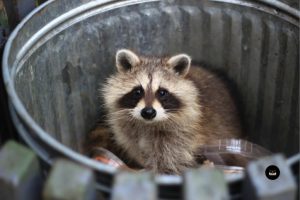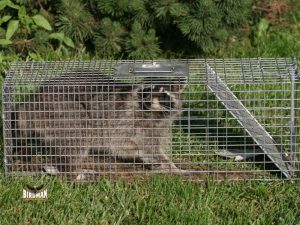At Birdman Wildlife Removal Services, we understand that your home is your sanctuary, and unwanted raccoon visitors can disrupt your peace of mind. Our commitment to humane trapping methods ensures that we protect both your property and the well-being of these clever creatures. Let us help you restore harmony to your home, knowing that our expert team uses the most ethical and effective techniques to safely remove raccoons while respecting wildlife.
Understanding Raccoon Behavior
To effectively and humanely trap raccoons, it’s crucial to understand their behavior:
- Raccoons are primarily nocturnal, active from dusk to dawn
- They are opportunistic omnivores, attracted to easily accessible food sources
- Raccoons are highly intelligent and adaptable, capable of solving complex problems
- They often seek shelter in attics, chimneys, and crawl spaces, especially during breeding season
The Importance of Humane Trapping
Humane trapping methods are essential for several reasons:
- Ethical treatment of wildlife
- Compliance with local and state regulations
- Minimizing stress and potential injury to the animals
- Maintaining ecological balance in urban and suburban areas
Birdman’s Approach to Ethical Raccoon Removal
Our expert team employs a variety of humane trapping methods, tailored to each unique situation:
Live Cage Traps
Live cage traps are one of the most effective and humane methods for raccoon removal. These traps:
- Allow for safe capture without harming the animal
- Come in various sizes to accommodate adult raccoons
- Can be baited with appropriate foods to attract raccoons
One-Way Door Systems
One-way door systems are particularly useful for attic infestations:
- Allow raccoons to exit but prevent re-entry
- Ideal for situations involving mother raccoons and their young
- Minimize stress by allowing animals to leave on their own terms
Exclusion Techniques
While not a trapping method per se, exclusion is a crucial part of our humane approach:
- Identify and seal potential entry points
- Install protective barriers around vulnerable areas
- Use deterrents to discourage raccoon activity
The Trapping Process: From Setup to Relocation
Our comprehensive trapping process ensures the safety of both the raccoons and your property:
- Site Assessment: We thoroughly inspect your property to determine the extent of the raccoon problem and identify the best trapping locations.
- Trap Setup: We strategically place traps in areas of high raccoon activity, using appropriate bait and camouflage techniques.
- Monitoring: Our team regularly checks the traps to ensure quick removal of captured raccoons and to prevent unnecessary stress.
- Humane Handling: Captured raccoons are handled with care to minimize stress during the removal process.
- Relocation: We relocate trapped raccoons to suitable habitats, following all legal guidelines and considering the animals’ well-being.
Legal Considerations
Raccoon trapping and relocation are subject to various regulations:
- Permits may be required for trapping and relocating raccoons
- There are restrictions on relocation distances and suitable release sites
- Certain methods of trapping or handling may be prohibited
Our team is well-versed in local and state wildlife laws, ensuring all our practices are fully compliant.
Preventing Future Raccoon Intrusions
After successful removal, we focus on prevention:
- Seal all potential entry points
- Install chimney caps and secure vents
- Advise on proper garbage management and removal of attractants
- Recommend landscape modifications to reduce raccoon habitat
By choosing Birdman Wildlife Removal Services, you’re not just solving a raccoon problem – you’re embracing a humane and ethical approach to wildlife management. Our comprehensive methods ensure that raccoons are safely removed from your property while being treated with the respect they deserve as part of our urban ecosystem. Let us help you achieve a raccoon-free home with compassion and expertise.
FAQs
How far away should raccoons be relocated after trapping?
The appropriate relocation distance for trapped raccoons varies depending on local regulations and wildlife management best practices. Generally, raccoons should be relocated at least 10 miles away from the capture site to prevent them from returning. However, it’s crucial to check with local wildlife authorities as some areas have specific guidelines or may prohibit relocation altogether. Professional wildlife removal services are familiar with these regulations and can ensure legal and ethical relocation.
What is the best bait to use in a raccoon trap?
Raccoons are attracted to a variety of foods, but some of the most effective baits include:
- Marshmallows
- Canned cat food (especially fish-flavored)
- Sweet corn
- Peanut butter
- Fish (fresh or canned)
The choice of bait may depend on the specific situation and local raccoon preferences. Professional trappers often have experience with what works best in your area and may use a combination of baits to increase success rates.
Is it legal to trap and relocate raccoons myself?
The legality of trapping and relocating raccoons yourself varies by location. In many areas, it is illegal for homeowners to trap and relocate wildlife without proper permits or licenses. Even where it is legal, there are often strict regulations about trapping methods, handling, and relocation distances. Additionally, improper handling can pose health risks due to potential diseases carried by raccoons. For these reasons, it’s generally recommended to hire a professional wildlife removal service that is knowledgeable about local laws and can safely and legally handle raccoon removal.

